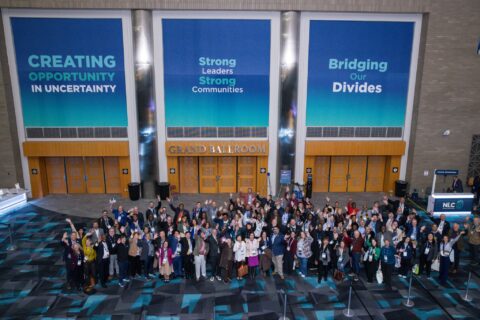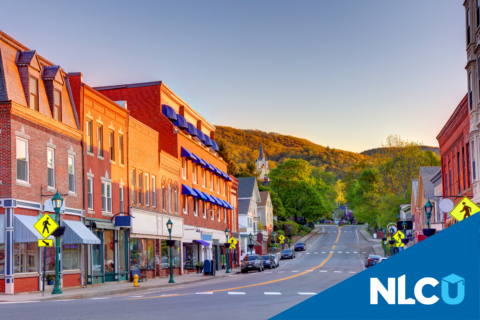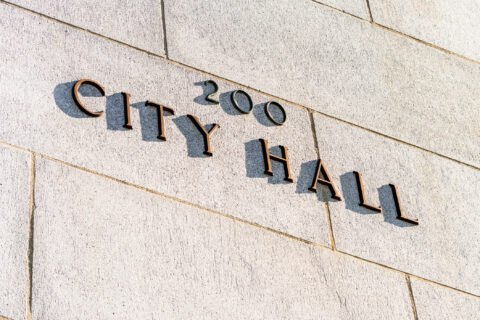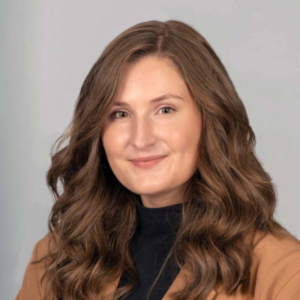Unprecedented federal funds can help America’s cities “build back better.” Cities can partner with intermediary organizations to leverage the hundreds of billions of dollars to provide immediate relief and help plan for equitable responses to future crises.
The funds—allocated through the American Rescue Plan Act, CARES Act, and fiscal year 2021 budget—will be a sizable portion of many cities’ annual budgets: Birmingham, Ala., for instance, will receive nearly $150M from the American Rescue Plan Act alone—equivalent to one-third of its FY21 proposed budget. American Rescue Plan Act funding for northeast Ohio cities will likely account for one-quarter to two-thirds of municipal budgets.
Mayors and city executives can engage intermediary organizations to maximize and sustain the sizeable investments coming their way. While there is no single model for this approach, city leaders can partner with community foundations, public health institutes, community coalitions and collaboratives, and community development financial institutions to align, plan, and carry out the work. This collaboration might include soliciting input from community members and residents, enabling intermediary organizations to serve as fiscal agents for these funds, regularly meeting to guide ARPA funding allocations, and convening cross-sector organizations invested in the community’s well-being. Intermediary organizations can also help cities address capacity and sustainability challenges such as workforce hiring.
Such collaborations are in line with NLC’s 5 Principles for ARPA Implementation, which includes developing plans for longer-term resilience, including using each revenue source strategically and engaging the community in planning. Examples of how cities are collaborating with intermediary organizations abound:
- Atlanta focuses on health equity: The Atlanta Regional Collaborative for Health Improvement (ARCHI) serves as the backbone organization of a multidisciplinary coalition of 100 organizations representing health care, public health, social services, government, housing, business, philanthropy, and transportation. The City of Atlanta has been involved since ARCHI’s inception, providing input on priorities and participating in ARCHI’s cross-sector and cross-jurisdiction efforts. Most recently, ARCHI partnered with the City to explore how public health interventions could address rising crime and violence. Guided by its 28-year strategy ARCHI uses a “collective impact” approach that keeps a vision for advancing health equity front and center. As an intermediary ARCHI supports all coalition partners by managing and deploying funds from private corporations, philanthropy, and government sources and often runs the day-to-day operations of early-stage, multi-sector projects.
- Durham, N.C., intentionally engages residents: Guided by its Equitable Community Engagement Blueprint, the City of Durham is placing new emphasis on intentionally seeking input from communities who are most adversely affected by a recently announced transportation project. The city is leveraging four community organizations to engage underserved communities to better understand the needs of residents and transit riders. Bragtown Community Association, Be Connected Durham, Durham Committee on the Affairs of Black People, and Luma Consulting will leverage deep relationships to engage communities historically excluded from transit and mobility decision-making processes.
- Milwaukee showcases the promise of cross-sector coordination: Existing and new cross-sector collaborations helped ensure efforts are aligned and resources are deployed strategically in Wisconsin’s largest city to address needs posed by the pandemic, including housing insecurity and mental health. The City of Milwaukee is involved in myriad ways, including with the mayor’s office commitment to aligning resources and increasing the capacity of local agencies and programs on the front lines of the pandemic and Milwaukee Health Department’s key role in care coordination for individuals testing positive for COVID-19 without a medical home. The Greater Milwaukee Foundation serves as an intermediary organization for such efforts, convening trusted community partners, setting priorities, and quickly deploying funds that might otherwise be delayed by administrative processes. The work will continue beyond the pandemic to drive longer-term systems change.
- Muskegon, Mich., relies on a fiscal agent: The Health Project, a community health benefit organization led by Mercy Health Muskegon, convenes and facilitates multisector community coalitions, provides care coordination, and runs programs that address community needs. City leaders are involved in leadership roles, help shape priorities, and bridge patient needs. Mercy Health serves as the fiscal agent, leveraging community benefit dollars, Medicaid reimbursement arrangements with two health plans, and other grants and contracts to fund many community-facing initiatives. Its ability to “braid” different funding streams in cohesive, coordinated ways that effectively tackle broad health challenges is particularly helpful knowing that federal funds will arrive to cities in multiple waves. During the pandemic, the City has supported The Health Project by providing financial allocations through recovery funds, soliciting patient input, and providing direct patient assistance including utility support and food distribution.
- Spokane, Wash., looks to a county-level intermediary: City and county leaders are partnering with Better Health Together, an Accountable Community of Health, to address homelessness in Spokane and the surrounding area. Through its Better Health Through Housing, the intermediary is creating cross-sector partnerships with the Spokane Housing Authority, hospital emergency departments, managed care organizations, and other community partners to provide wraparound services for the chronic homeless population. For smaller cities like Spokane leveraging intermediaries at the county or regional levels will be essential.
As cities prepare to receive much-needed relief through federal investments, these can serve as examples of how leaders can involve intermediary organizations to truly transform communities.
Learn More
To learn more about NLC’s work on this topic, please review A Challenge to Building Our Future and The American Rescue Plan Act: Benchmarking for Success.
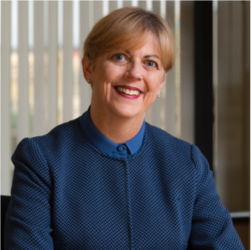
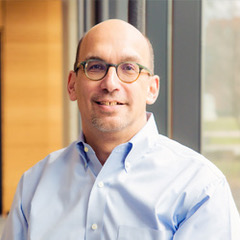
About the Authors:
Karen Minyard is the CEO of the Georgia Health Policy Center.
Jeffrey Levi, PhD, Funders Forum on Accountable Health at George Washington University.



